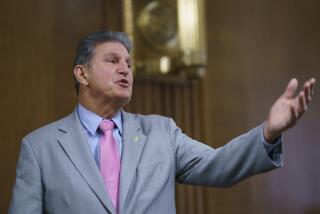White House Aide Resigns, Cites Budget : Staff: The assistant to Budget Director Rivlin says he was frustrated over lack of focus on deficit. But critics say frustration was over own lack of success.
- Share via
WASHINGTON — In a sign of growing tension within the White House over the President’s economic policies, a senior aide on Clinton’s economic team has resigned in protest over the Administration’s failure to deal more aggressively with the budget deficit.
The aide is Matthew Miller, chief of staff at the Office of Management and Budget and a top assistant to Director Alice Rivlin. Administration officials said Miller made it clear to Rivlin and others that he was resigning out of frustration over White House abandonment of its earlier focus on deficit reduction.
In its new budget, the Administration leaves the surging costs of entitlement programs untouched while offering tax cuts to the middle class.
Other Administration officials were sharply critical of Miller, however, accusing him of behaving as if his departure were a significant event and of masking his real reasons for leaving behind a dispute over policy. Some White House officials sought to dismiss him as a minor figure who had been frustrated as much by his lack of internal influence and stature as by the direction of Clinton’s policies.
Miller refused to comment Tuesday.
His departure led to suggestions that Rivlin is also frustrated by the recent turn of economic policy. But OMB spokesman Larry Haas stressed that Rivlin remains “enthusiastic and supportive” of the President’s budget.
“I don’t detect that Alice is frustrated in the least,” Haas said. “She believes that this Administration can have more than one goal, that tax relief for millions of Americans who have not shared in the fruits of this recovery can be just as important as deficit reduction.”
Miller, 33, joined the Clinton Administration as Rivlin’s aide when she was deputy director at OMB. He shared Rivlin’s zeal for budget-cutting and deficit reduction.
Early in the Administration, such views dominated the economic policy debate. Clinton’s 1993 economic plan emphasized deficit reduction while abandoning the President’s campaign promise of costly tax relief for the middle class. In fact, the degree to which Clinton seemed intent on gaining credibility on deficit reduction was one of the biggest surprises of his first year in office.
But the 1994 Republican landslide prompted the President to scramble to find ways to re-establish his ties to a middle class wooed by the House Republican “contract with America.” So in December, the White House unveiled a package of middle-class tax cuts, signaling that deficit reduction would no longer be its priority in budget policy.
Clinton then made a strategic decision not to offer any solution on the entitlement issue, which all budget analysts agree is the key factor in driving up the deficit. The President’s decision short-circuited work then under way by a White House task force on entitlements that was working hard to develop a new long-range solution to the runaway costs of Medicare and Medicaid.
“Clearly the Administration’s focus was taken off deficit reduction,” observed Susan Tanaka, vice president of the Committee for a Responsible Budget. “They talk about how critical it is to do something about health care costs, and then they propose to do nothing about it in their budget.
“The Administration now seems to believe that $200-billion annual deficits are acceptable. We don’t believe that $200 billion in deficits forever means that the budget is balanced.”
Faced with the Administration’s clear drift away from deficit reduction, Miller made the decision to leave in late December, after the President’s final budget deliberations were completed. He stayed on for several more weeks, however, to see OMB through the heavy work of putting the budget together.
Miller still has supporters both inside and outside the Administration. Rivlin is said by associates to have been saddened to lose him.
“I think Alice is really sorry to seem him go,” said one source. “I think she thought a lot of him.”
More to Read
Get the L.A. Times Politics newsletter
Deeply reported insights into legislation, politics and policy from Sacramento, Washington and beyond. In your inbox twice per week.
You may occasionally receive promotional content from the Los Angeles Times.








